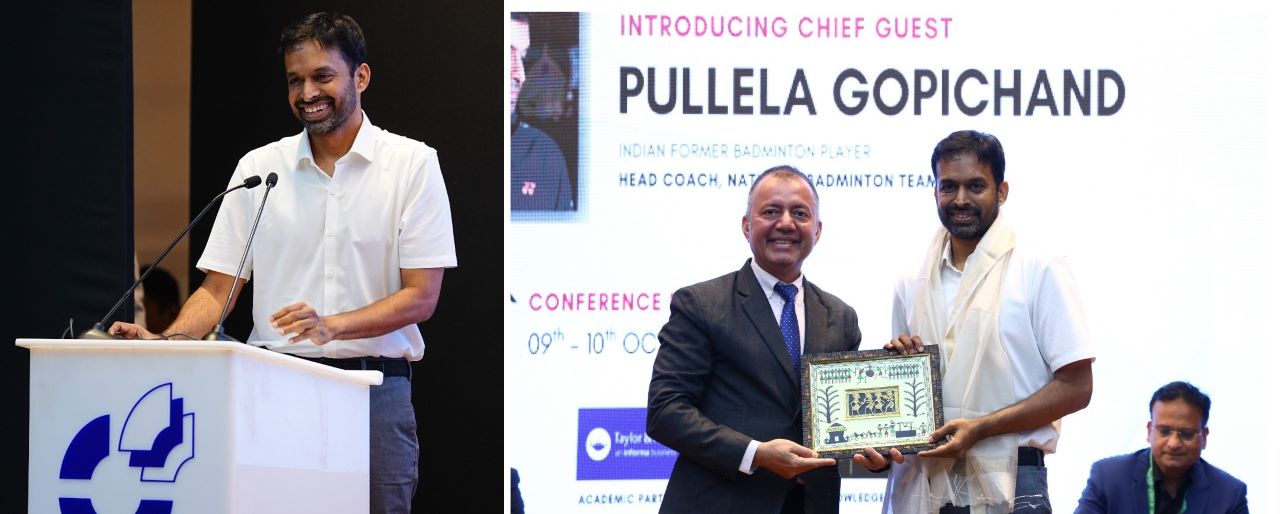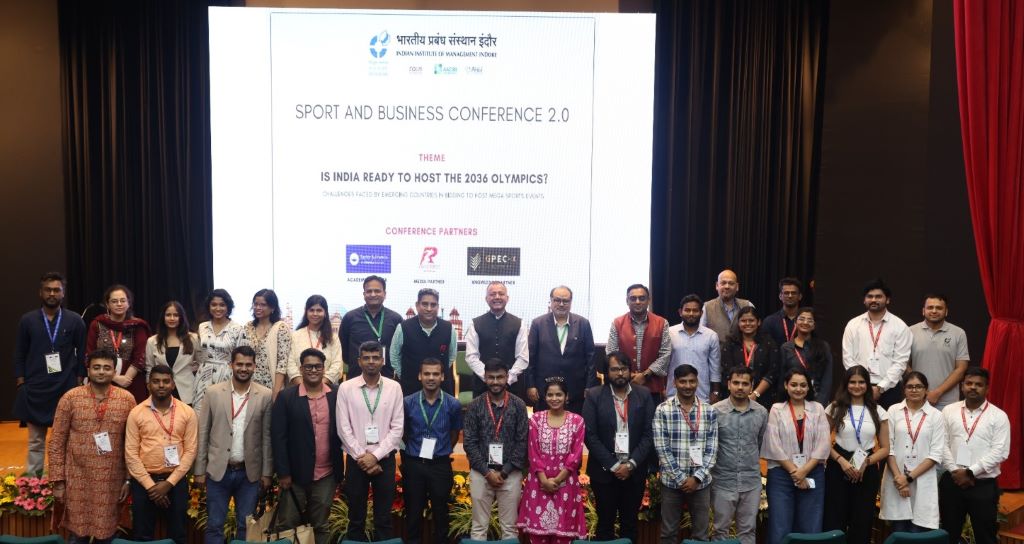Shri Pullela Gopichand remarked that sports have undergone significant evolution over the years, urging educators, policymakers, and institutions to focus not merely on producing champions but on nurturing physical literacy and inclusivity from a young age. He emphasized that true success in sports education is not determined by the best performer in class but by the positive experience of the last person in the class. “We should think not of how many are playing,” he said, “but of how many are not.” He said that the nation must reconnect with that purity while taking a calibrated and introspective view of its current systems. He concluded with a powerful message on resilience, noting that “the bigger the challenges you overcome, the stronger your mind becomes,” urging all stakeholders to embrace both the simplicity and the strength that sport inherently teaches.
Prof. Vijay Pereira shared the essence of collaboration between academia and industry. He emphasized the need for “knowledge ecosystems” that integrate academic rigor with practical realities, urging scholars to focus on research that influences policy and drives sustainable sports business models. Dr. Boria Majumdar, Founder and Editor-in-Chief of Revsportz, reminded the audience that sports in India are no longer just a spectacle but a serious avenue for business innovation, media evolution, and national identity-building.
Adding further depth to the day’s proceedings were two thought-provoking plenary addresses. Prof. Nalin Mehta spoke about the evolving politics and media narratives around Indian sport. He highlighted how sport has become a mirror of India’s social aspirations and its global image, suggesting that the road to 2036 is as much about nation-building as it is about athletic excellence. Mr. Ashok Namboodiri shared insights into the rapidly transforming global sports economy, where technology, fan engagement, and data analytics are redefining how sports are consumed and monetized.

A special session and a workshop were also conducted during the conference. The first session, led by Dr. Boria Majumdar on the topic “Sports Media and the Way Ahead”, examined how digital media is reshaping athlete narratives and sports journalism. He argued for a more responsible and nuanced media environment, one that empowers athletes and enhances the credibility of sports storytelling. Prof. Vijay Edward Pereira’s workshop titled “No Easy Road to Publication – How Not to Irritate the Editors” offered young researchers practical insights into the world of academic publishing, from crafting submissions to handling reviewer feedback constructively.
The conference also witnessed three panel discussions that blended academic inquiry with real-world insights. First panel discussion on “Practitioners and Sports”, moderated by Ms. Taruka Srivastav, Founder of The Playknox, brought together luminaries including Mr. Sushil Doshi, Padma Shri awardee and veteran cricket commentator; Mr. Akshat Khamparia, International Master; Mr. Ashok Namboodiri; and Prof. Uttiyo Raychaudhuri, Vice Provost at the University of Denver. The conversation centered around the business of sports broadcasting, athlete branding, and the challenges of maintaining authenticity in a highly commercialized sports world.
The second panel discussion focused on “Academics and Sports” and featured leading scholars, including Prof. Julia Balogun, Dean of the University of Liverpool Management School; Prof. David Cockayne, University of Liverpool, UK; Prof. Soudeep Deb, IIM Bangalore; Prof. Shovan Chowdhury, IIM Kozhikode; and Prof. Sunny Jeong, Wittenberg University. The panel underscored the importance of data analytics, interdisciplinary research, and evidence-based policymaking in shaping future sports strategies.
The third panel on “Healthcare and Sports” featured Prof. Vijay Pereira, Mr. Vinod Mukundan from Aktivolabs, and Prof. D. N. Venkatesh from the Goa Institute of Management. The discussion explored how advancements in sports medicine, wellness technology, and data-driven health monitoring can transform athlete development and longevity.

The second day of the conference showcased its own academic rigor, with parallel track presentations spanning multiple themes, including International Business and Sports, Finance, CSR, Ethics, and Performance Analytics. These sessions reflected the vibrancy of emerging research in the field and the diverse perspectives scholars are bringing to sport management studies.
With over two dozen international and national thought leaders sharing their expertise, IIM Indore’s Sport and Business Conference 2.0 reinforced the idea that the future of sports lies not only in athletic prowess but in the power of research, strategy, and innovation. As India aspires to Olympic glory, the conference served as both a mirror and a roadmap, reflecting the country’s current standing and its next steps.





